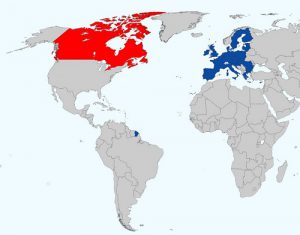On Wednesday, February 15, the European Parliament approved the Comprehensive Economic and Trade Agreement (CETA), a free trade agreement abolishing most trade restrictions between the European Union and Canada. Negotiators hammered out the 1,600-page agreement over the course of seven years before Canadian Prime Minister Justin Trudeau and European Council President Donald Tusk signed CETA last October 30. Then, the pact swept through the Strasbourg-based European Parliament by a vote of 408-254 with 33 abstentions last week.
What does it do?
 CETA would eliminate 98 percent of all tariffs on goods and services between the EU and Canada. With 500 million people, the EU is ranked the world’s largest (according to the UN) or second largest economy (according to the World Bank and IMF); Canada, with a population of 36 million, has the world’s 10th largest GDP. Canada and the EU currently engage in $67 billion (U.S., or €63.5 billion) in trade annually.
CETA would eliminate 98 percent of all tariffs on goods and services between the EU and Canada. With 500 million people, the EU is ranked the world’s largest (according to the UN) or second largest economy (according to the World Bank and IMF); Canada, with a population of 36 million, has the world’s 10th largest GDP. Canada and the EU currently engage in $67 billion (U.S., or €63.5 billion) in trade annually.
What are the benefits?
Supporters estimate the treaty will create jobs while reducing the prices of goods, increasing trade between CETA’s parties by 20 percent. EU exporters would save an estimated €500 million ($530 U.S.) a year in tariffs.
According to the European Commission website:
From day one, Canada will remove customs duties on EU exports worth €400m every year, rising to €500m a year at the end of phase-in periods. This will make Europe’s exports more competitive on the Canadian market.
European firms will also benefit from cheaper parts, components, and other inputs from Canada which they use to make their products. … Europe will be able to export nearly 92% of its agricultural and food products to Canada duty-free.
What are the drawbacks?
The primary opponent of the treaty is Wallonia, the 3.6-million, French-speaking province of Belgium the BBC describes as “staunchly socialist.” To be approved, all 28 members of the EU must ratify the agreement, and Belgium requires that all provincial governments authorize the federal government to ratify CETA. However, Wallonia vetoed the pact last October, over numerous objections.
Both Walloon officials and Marine Le Pen, the populist candidate running for president of France on a platform of “smart protectionism,” say CETA weakens national sovereignty by granting multinational corporations the power to sue in an international tribunal and overturn democratically enacted laws.
The agreement replaces the ad hoc committees that comprise existing investor-state dispute settlement (ISDS) arrangements with an Investment Court System (ICS). Companies who believe member nations’ laws violate the terms of the treaty may appeal to the ICS, a permanent body made up of 15 judges appointed by Canada and the EU. A randomly selected panel of three judges would hear the dispute. CETA also contains an appeals process. Investors have prevailed in 25 percent of ISDS cases, according to the UN Conference on Trade and Development (UNCTAD).
The European Commission responds that CETA will not affect “EU standards that protect people’s health and safety, social rights, their rights as consumers or the environment. … Imports from Canada will still have to satisfy all EU product rules and regulations … CETA won’t change how the EU regulates food safety, including on GMO products or the ban on hormone-treated beef.”
CETA’s opponents also object on job security and environmentalist grounds. For instance, the president-minister of the province, Paul Magnette, asked “if it is reasonable to import beef from the other side of the Atlantic when we are at the same time supposed to be fighting global warming.”
What’s next?
Ninety percent of CETA will take effect provisionally. But Magnette tweeted last Wednesday that he will not approve CETA until the province’s “conditions” are met, including his insistence that the European Court of Justice review and approve the ICS structure.
EU officials hope CETA will set the stage for a similar trade pact with Australia. “We hope to launch the negotiation with Australia in the second half of the year,” Sem Fabrizi, the EU’s ambassador to Australia, told The Australian Financial Review. Further, the UK would like to negotiate a post-Brexit free trade agreement with the EU; the successful adoption of CETA will prove to Westminster that such a deal is feasible.
Why should Christians care?
A free trade agreement between these two mammoth, similarly situated partners has the potential to vastly increase trade, reducing unemployment – which is rightly recognized as a spiritual problem. Aside from material considerations, joblessness deprives people of the ability to use their gifts for productive purposes and enjoy a sense of accomplishment. Trade also lowers consumer prices, freeing a greater portion of a worker’s paycheck for church or philanthropic goals.
(Photo credit: Farfur, cropped, CC BY-SA 2.0)

